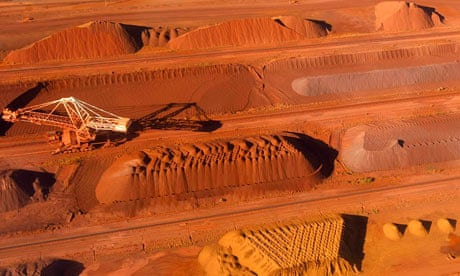In the clearest sign yet that the heady days of China's manufacturing boom are over, BHP Billiton, the world's biggest mining company, said iron-ore demand from China was "flattening".
The comments fuelled fears that the engine behind the global economic recovery is slowing down, and triggered a sell-off in mining stocks. Fresnillo, Antofagasta and Rio Tinto were among the worst casualties, all trailing near the bottom of the FTSE 100 index. BHP shares ended the day down 4% at £19.65.
China has been hoovering up stocks of iron ore, which is used to make steel, as it undergoes a modern-day industrial revolution. Among the main beneficiaries have been iron-ore miners in Australia, which have boosted output from 80m tonnes a decade ago to nearly 500m tonnes today. But demand is starting to slow as Beijing has moved to cool its economy.
The Chinese premier, Wen Jiabao, said last week that he would keep measures in place during his last year in office to deflate asset bubbles in the country. Beijing has forecast that the Chinese economy will grow by 7.5% this year, well below the 9.2% growth last year and 10.4% in 2010.
Speaking ahead of the annual global iron ore and steel forecast conference in Perth, Ian Ashby, president of iron ore at BHP, said he was confident China would meet its five-year economic growth targets but said iron-ore demand would soon hit "single digits, if it's not already there".
"The [Chinese] economy is shifting, it's changing," he said. "Steel growth rates will flatten and they have flattened."
The country's annual steel output was still expected to rise by about 60% by 2025, he said, arguing that the drivers for growth were still in place. By 2050 nearly three-quarters of China's 1.4 billion population is expected to be urbanised, he said, compared with less than half in 2010. Car production is also forecast to shoot up by 155% by 2025 to 28m units a year.
BHP said it was ready to respond to cooling demand but would still push ahead with its ambitious $10bn (£6.3bn) expansion plan, mining 165m-170m tonnes of ore a year. The company is the world's third-largest iron-ore miner behind Vale and Rio Tinto. The latter is also sticking with plans to raise capacity from its mines in western Australia's Pilbara iron-ore belt, betting on a soft landing for the Chinese economy.
Analysts say even single-digit growth in Chinese ore demand should be enough to soak up the planned output expansion.
Iron ore sold for $130-$147 a tonne over the last four months.
A report out on Monday predicted that global demand for iron ore would double to 3.5bn tonnes a year by 2030, with Chinese appetite continuing to drive the market, albeit at a slower pace than during the last decade.
The report, from the Perth-based Intierra Resource Intelligence, also said that Indian iron-ore exports could decline as the country's steel companies expand. There is a tussle between Indian iron mining companies, which claim there is enough of the commodity for both exports and increased domestic steel production, and the steel lobby, which wants to see exports curbed.
Paul Gray, analyst at Wood Mackenzie, said: "Certainly the rate of growth in Chinese demand is slowing, but the growth is from an ever-increasing base so the number of iron units required continues to rise."



Comments (…)
Sign in or create your Guardian account to join the discussion